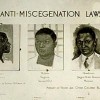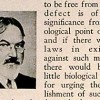Posts tagged eugenics

Sterilization Laws
Jan 18th
Based on a task force recommendation, the North Carolina legislature is considering paying $50,000 to living individuals sterilized by the state against their will or without their knowledge. North Carolina reportedly sterilized 7,600 individuals between 1929 and 1974. However, other American states also passed laws legalizing sterilization; the first was passed in Indiana in 1907 with the intent of giving prison inmates vasectomies as a way to prevent the transmission of “degenerate traits.”
Date on which each State inaugurated its eugenical sterilization law (view in Eugenics Archive)
In 1914, eugenicist Harry Laughlin published a Model Eugenical Sterilization Law that proposed to authorize More >

Eugenics Word of the Day: Miscegenation
Sep 24th
Recent news has again brought eugenics into present day politics. The GOP has decided not to endorse the candidacy in New York of Jim Russell for congress due his views published in a paper about 10 years ago. All funding, volunteers, and any other resources are being withdrawn. Russell’s comments about interracial marriage are drawing the most attention:
“In the midst of this onslaught against our youth, parents need to be reminded that they have a natural obligation, as essential as providing food and shelter, to instill in their children an acceptance of appropriate ethnic boundaries for socialization and for marriage.”
Almost More >

Designer Babies and Fitter Families
Jul 13th
So-called “designer babies” have generated fervent discussion in recent weeks, sparked by the latest online dating trend: a sperm and egg bank with the goal to make beautiful people. For some, genetic manipulation is a moral necessity, for others it is an ethical outrage. We are reminded of the eugenics movement.
“Better Babies” contests, originally conceived to promote child welfare and physical development, were the first eugenics contests run at a state fairs (the first held in 1908). By 1920, “Fitter Families” contests were also held at state fairs, where human “stock” was judged alongside cows, pigs, and produce. Contestants completed More >

Involuntary Sterilization?
Apr 15th
A North Carolina-based charity’s initiative to pay drug and alcohol abusers to be sterilized or choose long-term birth control (IUD) has popped up recently in my Google “eugenics” news alert. Once an addict proves they have had a procedure to prevent pregnancy, they are given $300. Several thousand individuals have participated in the program in the US. The group argues that the policy will prevent the birth of children that will likely become a societal burden or at the very least be raised in an unstable environment. Those who oppose the initiative argue that often addicts get clean with the More >

Positive Eugenics?
Mar 9th
Recently a campaign by a Georgia anti-abortion group featured billboards that depicted a black baby and the text “Black children are an endangered species.” [See this Associated Press article.] As you may imagine, the billboards were instantly controversial and provoked heated discussion among abortion-rights and anti-abortion activists. Motivated by the desire to promote an agenda, the group that initiated the campaign argued that abortion is linked to race, and has been since the founding of Planned Parenthood by Margaret Sanger in the early 1900s. Others say they are trying to bait African Americans into opposing abortion through shame and fear.
Population More >

Eliminating Undesirable Traits
Feb 18th
Eugenics aimed to eliminate undesirable traits. But how do you define “undesirable”? There is anecdotal evidence that the incidence of some disorders has decreased due to genetic testing (see “Testing Curbs Some Genetic Diseases,” by Marilyn Marchione). In and of itself, this is a good thing, but is this eugenics? It would be hard to argue that most genetic diseases are undesirable; but some of the steps taken to eliminate disease — abortion, embryo screening — are controversial.
In contrast, there was a an effort to prevent hereditary blindness within the eugenics movement. Its proponents collected pedigrees, drafted legislation to prevent More >

Contemporary Carrie Buck?
Jan 6th
Recently, a 35-year-old woman sued a Boston-area hospital for performing a tubal ligation, thus sterilizing her, after the birth of her 9th child. Tessa Savicki states that she requested an IUD, a reversible form of birth control. Because two of her children are on welfare and she is unemployed, Tessa’s case has sparked passionate reactions and brings to mind the case of Carrie Buck.
The similarities are numerous. A poor woman sterilized against her wishes, judged by others to be unfit (just read the public comments on the news sites featuring Tessa’s story), and having children out of wedlock. There is More >

Colbert on Eugenics
Dec 3rd
Recently on The Colbert Report, in typically tongue in cheek fashion, “You-genics” was highlighted in “The Word” segment (October 28, 2009). Colbert’s discussion was tied in with our nation’s current health care debate – who is and isn’t coverable, what constitutes a pre-existing condition, and how to breed an insurable individual. Taken literally, Colbert’s words didn’t sound far off from those of proponents of the eugenics movement itself. Taken as intended, we see that a sense of humor can offer a unique perspective on anything.
Not surprisingly, eugenicists considered sense of humor as a trait to be studied, and the archive More >

Hybrid Vigor in Corn and People
Nov 30th
The recent completion of the maize (corn) genome sequence gives us pause to think about the historical connection between agriculture and eugenics. It also causes us to consider why the leading American eugenicist, Charles Davenport, failed take greater stock in the corn research going on at one of several institutions he presided over at Cold Spring Harbor.
Especially in the United States, eugenics was firmly grounded in agriculture. Many of the leaders of the American movement had backgrounds in plant and animal breeding. For example, prior to becoming superintendent of the Eugenics Record Office (ERO) at Cold Spring Harbor, Harry Laughlin had More >

The Continuum of Eugenics Practice
Oct 22nd
Francis Galton, the English scientist who coined the term, defined eugenics as “the agencies under social control that improve or impair the racial qualities of future generations either physically or mentally.” Charles Davenport, the father of the American eugenics movement called it simply “the self direction of human evolution.”
These definitions stress differences that occupied either end of a continuum of eugenics practice. At one end, Galton’s definition stressed social control, or laws, to control human reproduction. At the other end, Charles Davenport’s stressed an individual’s own control over their reproduction. Social control ultimately embodied “negative eugenics”– limiting mixed race marriages, More >
